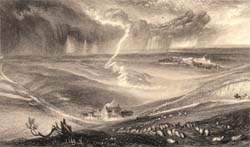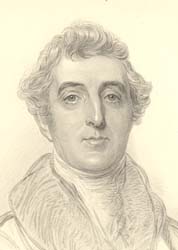|
|
Home | Corson Collection | Biography | Works | Image Collection | Recent Publications | Portraits | Correspondence | Forthcoming Events | Links | E-Texts | Contact Paul's Letters to His KinsfolkFirst Edition, First Impression: Paul's Letters to His Kinsfolk. Edinburgh: Printed by James Ballantyne and Co. For Archibald Constable and Company, Edinburgh; and Longman, Hurst, Rees, Orme, and Brown, and John Murray, London. 1816. Composition | Synopsis | Reception | Links Composition
SynopsisScott was amongst the first British civilians to view the battlefield at Waterloo, and provides in letters VII-VIII a close account of the conflict. Contemporaneously, he subjected the same material to a poetic treatment in his The Field of Waterloo, a verse narrative published in aid of a fund set up for widows and orphans of soldiers. In the Letters, Scott goes on to describe the scene of devastation on the battlefield, and the emergence of a tourist industry selling relics of the battle. Passing through Flanders, Scott describes the artistic and architectural treasures of its cities, but also devotes space to an analysis of the economic and political repercussions of its union with the Netherlands.
Scott goes on to analyse the state of the various parties in post-Napoleonic France (royalists, imperialists, and liberals), noting the weakness and instability of the restored Bourbon dynasty and foreseeing the reaction that would bring it down. He is concerned by the apparent decline in religious sentiment of the French people and perceives a concomitant decay in morality. ReceptionUpon his return to Scotland, Scott found writing up his travel notes a wearisome chore and yearned to press ahead with his third novel The Antiquary. Published on January 25, 1816, the Letters were nonetheless well received by the public, rapidly going through three editions. For once, the reviews too were unanimously laudatory. Although the volume appeared anonymously, none had any difficulty in recognizing Scott as the author. Indeed, for the Antijacobin Review, the Letters showed that Scott was 'a much better prose-writer than a poet'. There was almost no adverse criticism, with the Augustan Review, British Critic, Gentleman's Review, and Scots Magazine being particularly fulsome in their praise. Only the Eclectic Review took issue with Scot's analysis of the religious state of France but still spoke of the Letters as capable of giving 'much pleasure'. LinksLast updated: 19-Dec-2011
|
|||

 On hearing the news of the Allied victory at Waterloo (June 18,
1815), Scott longed to visit the battlefield and to see newly conquered
Paris. Continental Europe had been closed to British visitors during
the Napoleonic Wars, and Scott had never before travelled abroad.
In August, he set sail for Belgium, hoping to recuperate his expenses
by writing a series of imaginary letters recording his impressions.
Collected as Paul's Letters to His Kinsfolk (1816), these
not only document Scott's personal reaction to the scenes he passed
through, but provide a detailed history of Napoleon's last campaign
based on interviews with participants and (not always reputable)
eyewitnesses. Here, Scott is notably equitable in his treatment
of the Emperor, acknowledging his military genius and regretting
only that he chose not to lay down his own life along with his
Guard. A similarly non-partisan approach would later be adopted
in Scott's
On hearing the news of the Allied victory at Waterloo (June 18,
1815), Scott longed to visit the battlefield and to see newly conquered
Paris. Continental Europe had been closed to British visitors during
the Napoleonic Wars, and Scott had never before travelled abroad.
In August, he set sail for Belgium, hoping to recuperate his expenses
by writing a series of imaginary letters recording his impressions.
Collected as Paul's Letters to His Kinsfolk (1816), these
not only document Scott's personal reaction to the scenes he passed
through, but provide a detailed history of Napoleon's last campaign
based on interviews with participants and (not always reputable)
eyewitnesses. Here, Scott is notably equitable in his treatment
of the Emperor, acknowledging his military genius and regretting
only that he chose not to lay down his own life along with his
Guard. A similarly non-partisan approach would later be adopted
in Scott's
